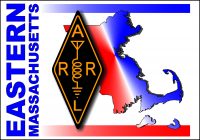It is great to see more and more daylight hours again. In a few weeks we change once again to daylight savings time. It feels like spring is very near. I hope all are taking advantage of the colder weather and getting on the air.
February began with the section Simulated Emergency Test (SET). NTS had a part in this exercise and it was good to see folks taking part in the various NTS nets that were in operation. Traffic nets operating for the two hours included MARIPN, MARIDN and EM2MN. Thanks to those managers for their service in keeping these nets available for message traffic. Folks checking in included N1LAH, K1UI, K1GRP, K1UAF, KC1KVY, W1RVY, KW1U, KC1NEK, KB1VXY, KC1RVS, N5CQU and WZ0C. Thanks to all for your support of this important exercise where we test our skills and see what we do well and what needs improvement.
I would like to highlight this month a new ham who was first licensed in 2021 and upgraded to general in late 2022. Chris Ranney, WA1CMR of Sandwich MA was introduced to amateur radio after joining the Sandwich CERT team in 2019 where he quickly learned he needed an amateur radio license to operate the radios in their Emergency Operations Center. He also joined the Cape and Islands ARES team where he discovered NTS messaging. He was hooked, and joined the Cape and Islands Traffic Net (CITN) to hone his skills. He has been active ever since, and in January 2024 he began checking into the Mass Rhode Island Phone Net (MARIPN) on HF, He has a goal to learn FLDigi this year in order to check into MARIDN, the Mass Rhode Island Digital Net.
Chris has served as President of the Falmouth Amateur Radio Association (FARA) and in looking for programs of interest for club meetings he discovered there was a good deal of interest in the National Traffic System (NTS). He decided to form a Cape and Islands NTS Training Net where folks could learn and practice handling traffic in a safe and encouraging environment. It was to be an opportunity, as well, to work on becoming a competent net control. He received approval from Section Manager Jon McCombie N1ILZ, and Chris says both N1ILZ and Tim W1TCD, manager of CITN have continued to provide him with advice and encouragement. The CITN Training Net continues to meet on the Falmouth N1YHS 147.375 repeater every Tuesday. Great job Chris!!! You have set a good example for newer traffic handlers. Thanks for providing this training opportunity.
I would also like to call attention to another success story from a welcome to amateur radio radiogram delivery. Shawn Dodds N1CVO, a regular participant on the Heavy Hitters Traffic Net delivered such a greeting to Dave Marcucci of Tyngsboro when Dave was first licensed last September. Dave’s interest in message handling was piqued and he began checking into traffic nets and has begun composing and sending radiograms to new hams. I recently handled a message Dave was sending to a new licensee in Oregon. Since receiving that radiogram the recipient has begun checking into his local traffic net. Dave says he will likely do more of this and feels like this is a great way to introduce people to NTS. He says he also shares the Traffic Trivia website https://www.traffictrivia.com/ with people because that was an interesting way for him to practice sending traffic. Thanks Dave for your participation and support and for paying it forward so others can learn and join the fun of NTS.
My traffic tip this month raises the question, to spell or not to spell? When and why do we spell words phonetically? A primary consideration is to try to understand the perception of the receiving operator. If there is any chance of misunderstanding or ambiguity it is generally wise to spell. If you are going to spell a word or group, be sure to introduce that spelling with the introductory words, “I spell” or in the case of groups, “figure(s)”, “initials”, “mixed group” etc.
Instances where spelling would be most likely required include:
(1) Last names in addressees and signature
(2) Proper names
(3) Introduced groups such as
(a) initials (initial or letter groups (X = initial X-ray,
(b) letters in a mixed group (6PM = six papa mike),
(c )amateur call signs (Whiskey one alpha whiskey,
(d) handling instructions (hotel x-ray charlie,
(e) ARRL radiogram numbers in texts (arl fifty –
which can sound like arl sixty and change the meaning entirely.
It is important to use phonetics since many letters can sound the same. B, C, D, E, G, P, T, V, Z for example. And when using phonetics, as a traffic handler we always use standard ITU phonetics which can be found online. When we all use the same phonetics it is far more likely we will be understood by the receiving station.
Don’t forget to sign up for the NTS Letter if not done so already. ARRL members can go to their profile page on the ARRL website, click on their name at the top of the main page, click on Opt-In on the left column of your profile page and click on “Edit” at the top of the page. When you see all possible newsletters, click on NTS Letter and save. If you are not an ARRL member check our groups.io page, MA-NTS@groups.io. I have been posting them there.
Thanks to all for your participation and support.
73, Marcia KW1U
Section Traffic Manager

